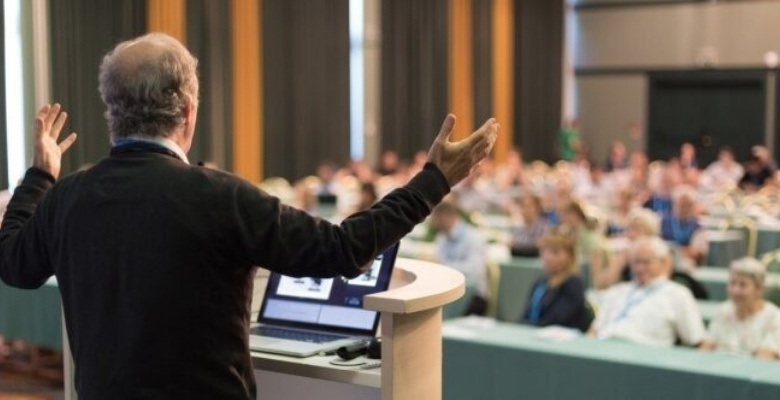A conference opening speech can quietly shape how the entire event feels. It may only last a few minutes, but those few minutes can bring energy, direction, and a sense of welcome. You might be thinking about what makes a good conference opening speech example and how to get started the right way.
The ideal conference opening speech welcomes the audience, introduces the event’s purpose, highlights key parts of the program, and sets a clear tone. It should be short, honest, and thoughtful. A strong start builds interest, creates comfort, and helps everyone feel ready for what’s ahead.
If you’re wondering how to begin, what to include, or what to avoid, you’re not alone. Many people want to get it just right. This article brings together everything you need to know in one place—clear steps, real examples, and helpful tips.
Conference Opening Speech Example
The opening speech sets the tone for the entire event, whether it’s a corporate meeting, leadership forum, academic summit, or international conference. Here are some unique and flexible opening speech samples to help you confidently and clearly greet your audience.
Academic Conference Opening Speech Example (Formal & Respectful)
Good morning, everyone. It is an absolute honor to welcome you all to the 5th International Research and Innovation Conference here in Toronto. We are truly delighted to see such a diverse group of scholars, researchers, and professionals from across the globe.
Your presence signifies a shared passion for ………………….
Download the full version here
Leadership Conference Opening Speech Example (Inspiring & Uplifting)
Hello and welcome, everyone! I can feel the energy in this room, and it’s truly exciting. We’re gathered here not just to listen—but to lead, to challenge limits, and to shape what leadership looks like in today’s world.
This conference isn’t about speeches alone ………………….
Download the full version here
Technology Conference Opening Speech Example (Friendly & Forward-Looking)
Welcome to FutureTech! It’s incredible to see innovators, developers, founders, and thinkers all gathered under one roof. The pace of technology is thrilling—and so is the impact we can make together.
This year’s conference is all about ………………….
Download the full version here
Social Impact Conference Opening Speech Example (Human-Centered & Empathetic)
Good morning, everyone. Thank you for choosing to be here—especially those who work tirelessly for causes bigger than themselves. This gathering isn’t just an event—it’s a moment to pause, connect, and grow as a collective.
Each of you carries stories, experiences ………………….
Download the full version here
Business Conference Opening Speech Example (Strategic & Executive)
Ladies and Gentlemen, welcome to the Global Business Strategy Forum 2025. It’s a privilege to convene this group of thought leaders, decision-makers, and forward-thinkers at a time when agility and innovation are vital to our industries.
The theme this year—“Reimagining Growth”—encourages us to think ………………….
Download the full version here
Academic Summit Opening Speech Example (Formal & Visionary)
Good morning, distinguished guests, scholars, and academic partners. It’s with great pride that I welcome you to the 3rd Global Academic Excellence Summit. We gather here as a community devoted to the pursuit of knowledge, critical thinking, and academic advancement across borders and disciplines.
This summit offers more than presentations ………………….
Download the full version here
Leadership Forum Opening Speech Example (Motivational & Purpose-Driven)
Welcome, leaders, visionaries, and changemakers! It’s a true pleasure to open this year’s Global Leadership Forum. This isn’t just a gathering—it’s a spark. A spark for bold conversations, renewed purpose, and collective action.
Leadership today is about more than titles ………………….
Download the full version here
Corporate Meeting Opening Speech Example (Professional & Results-Focused)
Good morning, colleagues and partners. Thank you for being here for our Annual Corporate Strategy Meeting. Today, we take a moment to pause, align, and prepare for the next phase of growth and innovation in our company’s journey.
As we review key achievements, assess upcoming challenges, and set our strategic direction, I encourage each of ………………….
Download the full version here
Conference Opening Speech Short Versions by Time
Not every opening speech needs to be long to make an impact. Sometimes you only have 30 seconds, sometimes a minute, or maybe two minutes to set the right tone. In that short time, the goal is to welcome the audience, share the purpose, and spark excitement for what’s ahead. Below are quick versions you can use depending on how much time you have—each one designed to be clear, simple, and memorable.
30-Second Conference Opening Speech
Good morning, everyone. Welcome to [Conference Name] here in [City]. It’s wonderful to see so many of you gathered to share ideas and connect. Today, we’ll explore [main theme], learn from amazing speakers, and build new connections. Thank you for joining us—let’s get started.
Download it in PDF format.
1-Minute Conference Opening Speech
Hello and welcome to [Conference Name]. I’m truly honored to stand here and greet such a diverse and inspiring group. This event is about more than speeches—it’s about exchanging ideas, building connections, and exploring fresh opportunities together. Over the course of today, you’ll hear from [key speakers/topics], take part in discussions, and connect with people who share your passion. Thank you to our organizers, sponsors, and every one of you for making this possible. Let’s begin and make this conference a success.
Download it in PDF format.
2-Minute Conference Opening Speech
Good morning, ladies and gentlemen, and welcome to the [Conference Name]. It’s a privilege to have you here in [City], where we gather not only to discuss ideas but also to shape the future together. Over the next [number of days], you’ll hear from leading voices in [industry/topic], take part in sessions designed to challenge and inspire, and meet people whose ideas may spark your next breakthrough.
I’d like to thank our organizing team for their dedication, our speakers for sharing their expertise, and our partners for their support. Most importantly, I’d like to thank you—the participants—for bringing your energy and curiosity. Let’s make this event a time of learning, connection, and inspiration. With that, let’s begin.
Download it in PDF format.
How Long Should a Conference Opening Speech Be?
Conference speeches don’t always have to be long to make an impact. The right length for an opening speech usually depends on the speaker’s role and the type of event. Keeping this in mind helps you stay focused and clear. Take a look at the table below to see what’s commonly expected.
| Role | Recommended Duration | Purpose |
| Keynote Speakers | 30 to 45 minutes (sometimes up to 60) | Deliver in-depth presentations and set the tone for the conference |
| Conference Chairs or Organizers | 5 to 10 minutes | Provide a welcome, outline the agenda, and acknowledge key people |
| Panel Moderators or Session Hosts | 2 to 5 minutes | Briefly introduce panelists and explain the session objectives |
| Delegates or Participants (e.g., MUN) | 1 to 2 minutes | Share quick opening statements focused on positions or topics |
Keeping your speech within the right time helps people stay focused. It also shows respect for the audience and the event schedule. Whether you speak for one minute or an hour, make every second count. Always plan ahead to fit your role and keep things smooth.
What Makes the Conference Opening Speech Memorable?
Some speeches feel dull, while others stick with you long after the event ends. A good opening speech doesn’t just welcome people—it builds excitement, curiosity, and connection. Keep reading to learn what really makes it memorable.
Strong First Impression
When a speaker walks on stage and grabs attention right away, it sets the mood for everything that follows. Whether they open with a powerful quote, a fun story, or a simple “thank you,” it helps people feel welcome. That first moment matters a lot because it tells the audience, “You’re in the right place.” It also makes people want to listen. A strong beginning can shape how people see the whole event.
Real and Relatable
Many great events open with warm greetings or lighthearted stories. These personal touches instantly make the moment feel real and approachable. For example, if you’re speaking at conferences in Canada, you could start with a funny travel moment, a thoughtful local reference, or a memory that connects with the audience. Small details like this help everyone feel more at ease and engaged right from the beginning.
Clear Message
Every good opening speech has a clear point. The speaker doesn’t just talk—they give the audience a reason to care. Whether it’s about teamwork, new ideas, or celebrating progress, the main message should be easy to understand. When the speaker is clear, the audience knows what to expect and what to look forward to. It’s not about big words, just clear thoughts that stick.
Right Energy
Some speeches are calm, while others are full of excitement. It depends on the event, but either way, the speaker’s energy should match the room. If the speaker is too quiet or too loud for the setting, people lose interest. The right energy can make the audience feel ready and alert. It helps create a strong mood right from the start that lasts through the day.
Natural Flow
Nobody likes speeches that feel like a list. A great one moves smoothly from one idea to the next. It should feel like a story, not a report. When speakers talk in a natural way, people follow along without getting confused. Good flow makes the speech easier to remember and keeps everyone listening. It doesn’t need to be perfect—it just needs to feel real and connected.
Short and Sharp
Sometimes less is more. A speech that goes on for too long can lose people, no matter how good it is. The best ones are short, clear, and full of meaning. They don’t try to do everything in one go. Just a few thoughtful words can be more powerful than a long speech. Timing really matters, and ending on the right note can leave a lasting impact.
A Personal Touch
What really makes a speech stand out is the feeling behind it. If the speaker talks like they care, people will care too. A personal moment, a thank-you to the team, or even a story about what the event means to them can turn a simple speech into something special. That’s why even a short welcome speech for conference can become one of the most remembered moments of the day.
How to Structure Your Conference Opening Speech?
Getting your conference speech ready might feel a little confusing at first. But when you break it into simple parts, it becomes much easier. A strong opening sets the mood for the entire event. If you want to know how to do it right, keep reading below.
Warm Welcome
Start by smiling and letting people feel comfortable in the room. A short thank you to the guests, organizers, and audience helps build a good vibe. You can also greet any special guests or teams by name. Don’t use fancy words—keep it short and warm. The goal is to make people feel like they belong. A warm welcome gets attention without making anyone feel left out or bored.
Acknowledgments
Take a moment to thank those who made the event possible, such as the organizing team, sponsors, or special guests. Even a quick mention shows gratitude and builds goodwill. Acknowledging others highlights teamwork and respect in front of the audience. It also makes the people you thank feel recognized and appreciated.
Event Purpose
Before jumping into the day’s schedule, explain why the event matters. Try sharing the main goal behind the gathering using simple words. You could tell how this event was planned or who helped make it happen. Mention what kind of ideas will be shared. That helps everyone understand the bigger picture. When people know the reason for the event, they stay more interested and focused.
Today’s Highlights
Let the audience know what exciting things are going to happen next. Point out a few key speakers, important topics, or special sessions. You don’t need to mention every detail—just enough to build excitement. When people know what’s coming, they pay more attention and enjoy it more. You can even tease one or two surprises. This part helps set a clear plan for the day ahead.
Real Story
Nothing grabs attention like a short, real-life story or moment. You might talk about how you felt preparing for this speech. Or you can share something simple about your first time at a similar event. People connect with real feelings and honest words. It helps them trust you and enjoy listening. Just one story or thought can make the whole speech more memorable and special.
Confident Close
As your opening speech ends, give people a strong reason to feel excited. You can ask them to take part, ask questions, or share ideas. Leave them with a happy tone, not just facts or rules. Even a small joke or smile can make a big difference. If you’re delivering an opening speech for a conference, end with simple words that spark energy. A strong close is like a good start to everything else.
You don’t need to be perfect to give a great speech. Just be honest and speak clearly from your heart. Use simple words that everyone can easily understand. When you truly care about what you say, people will listen.
How to Add Humor or a Personal Touch to Your Conference Opening Speech?
Some speeches feel too serious, but they don’t always have to be. A little laugh or story can change the whole mood of the room. It helps the speaker feel more connected with the people listening. Keep reading to find out how to do it right.
Know Your Crowd
People enjoy speeches more when they feel like they’re made just for them. If you want to prepare a welcome speech for international conference, it becomes easier when you understand what kind of people are in the room. You can add humor that matches their interest or event theme. This doesn’t mean making big jokes—just small comments that feel right. Even a tiny moment of fun can make people feel closer and more engaged.
Share a Story
Listeners like when speakers share something that actually happened to them. It makes everything feel more real and not like something practiced or fake. You can talk about a small mistake, a funny moment, or even a short memory. These stories help everyone feel more relaxed. They don’t need to be perfect—just true. And when people relate to it, they will enjoy the speech even more.
Keep It Light
Speeches don’t always need to be serious to be meaningful or strong. A tiny joke about the weather or even your own nervousness can help break the tension. This small touch adds to conference engagement by making the atmosphere lighter and helping people enjoy listening. Just make sure the humor is simple, kind, and safe for everyone in the room.
Be Yourself
Most people don’t enjoy speeches that sound too stiff or fake. You don’t need to act funny if you’re not like that normally. It’s better to just be calm, kind, and speak with real feeling. Use your normal voice and words that feel natural. That helps people trust what you’re saying. They will connect better when you sound like a real person, not someone reading lines.
Add Small Details
Even little things can help the audience feel more connected to your speech. Saying thank you to someone or talking about a quick moment adds a nice touch. These details show that you care about being there and talking to them. People remember the feeling behind your words more than the words themselves. So, saying something simple and honest can really make your speech stronger and more meaningful.
Common Mistakes to Avoid in Conference Opening Speeches
Delivering a conference opening speech may look simple, but it needs careful thought. The first few words can shape the whole event, and even small mistakes can make things feel awkward or confusing. Here are the key things to avoid:
Delivery Mistakes
- Speaking too fast makes it hard for people to follow what you’re saying.
- Using long or complicated words can confuse the audience.
- Reading every word from paper makes the speech sound boring and less personal.
- Talking too long without a clear point can quickly lose attention.
Engagement Mistakes
- Forgetting to smile or greet the audience makes the speech feel cold.
- Not making eye contact and only looking at notes makes you seem disconnected.
- Ignoring the event theme or purpose makes the opening feel out of place.
- Overloading the speech with too many details or facts can overwhelm people.
Respect Mistakes
- Starting without thanking anyone may look rude to organizers and guests.
- Not knowing or mispronouncing the names of special guests can feel careless.
- Making jokes that don’t fit the mood can create awkward or even offensive moments.
Technical Mistakes
- Not checking the microphone or sound before speaking can cause awkward pauses.
- Starting without a proper welcome line makes the speech feel abrupt.
Closing Mistakes
Ending without a strong or clear closing leaves the audience unsure about what’s next.
A good opening speech doesn’t need to be perfect, but it should feel warm, clear, and respectful. By avoiding these small but common mistakes, you can set the right mood and make the event flow smoothly from the very start.
Frequently Asked Questions
Here’s a short FAQ section to help answer some common questions about conference opening speeches. These answers cover extra details that weren’t explained earlier. If you’re planning to speak or organize an event, this part will guide you better. Let’s look at some helpful answers you might need.
Can a Student Give the Opening Speech?
Yes, a student can give the opening speech if the event allows it. For example, in school or youth-led conferences, students are often invited to speak. The important thing is to speak clearly and stay confident. It’s a great chance to practice public speaking and share a message.
What If I Get Nervous Before Speaking?
Getting nervous is very common, even for experienced speakers. You can take deep breaths and speak slowly to feel better. Focus on one sentence at a time instead of the whole speech. The audience is there to listen, not to judge you.
Should I Use a Microphone?
If the room is large or the audience is big, a microphone helps everyone hear you. Before you start, test it to check the sound. Hold it at a good distance from your mouth—not too close or too far. Speaking clearly matters more than speaking loudly.
How Can I Practice the Speech?
You can practice by reading the speech aloud a few times at home. Try standing in front of a mirror or asking a friend to listen. Practicing out loud helps you find mistakes and improve your tone. Don’t try to memorize every word—just understand your points.
Can I Add a Quote in My Speech?
Yes, adding a short quote can make your speech more interesting. Pick a quote that matches the topic of the event. Say it slowly and clearly so people can understand. But don’t use too many quotes—one is usually enough.
Is It Okay to Use Notes?
Using notes is totally fine if it helps you stay on track. Just avoid reading every word without looking up. Keep your notes short and clear so you don’t get lost. Glancing at notes while speaking is better than forgetting important parts.
What Should I Wear for the Speech?
Wear something that looks neat and fits the event type. You don’t need to dress fancy, but make sure your clothes are clean and proper. Looking tidy helps you feel more confident on stage. It’s also a sign of respect for the event and audience.
Can I Use Hand Movements While Speaking?
Yes, using hand movements can make your speech more engaging. Keep them natural and don’t overdo it. Simple gestures help explain your words better. Just be sure your hands don’t move too fast or distract the audience.
What Do I Do If I Make a Mistake?
If you make a mistake, don’t worry, just pause and fix it calmly. Most people won’t even notice small errors. Laughing it off or moving on quickly keeps things smooth. Remember, everyone makes mistakes, sometimes it’s okay.
Last Words
Every conference deserves a strong start, and nothing sets the mood better than a thoughtful welcome. From sharing the purpose to creating a positive tone, your speech makes a big difference. If you were looking for ideas, now you’ve found the right conference opening speech example to help you speak with confidence.
Remember to smile, speak clearly, and keep your words simple and real. Avoid sounding too formal or reading everything word by word. Trust your message, connect with the audience and enjoy the moment. Best wishes for your upcoming conference speech!










